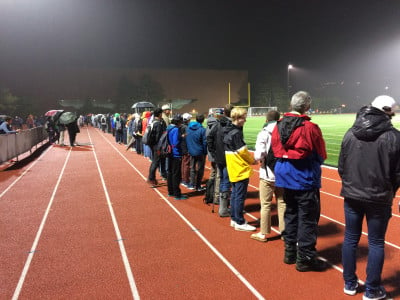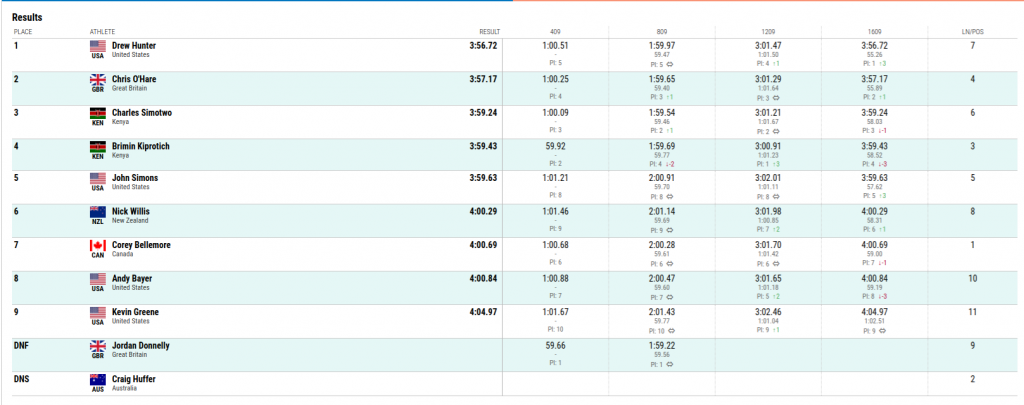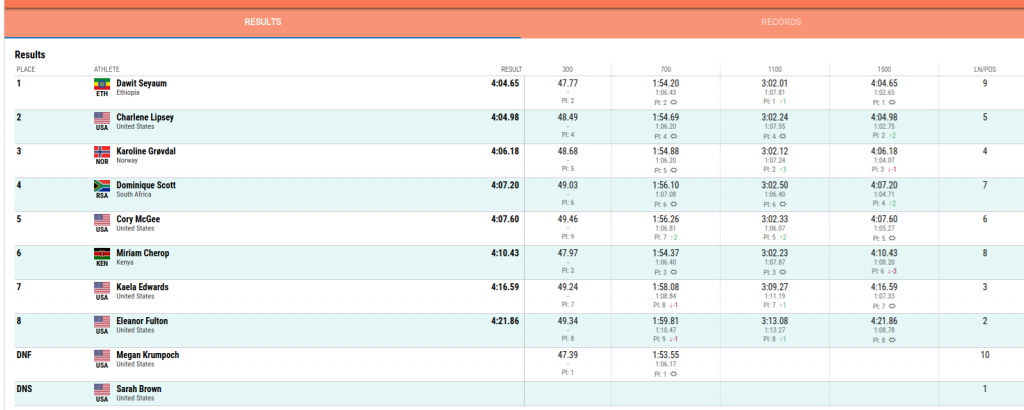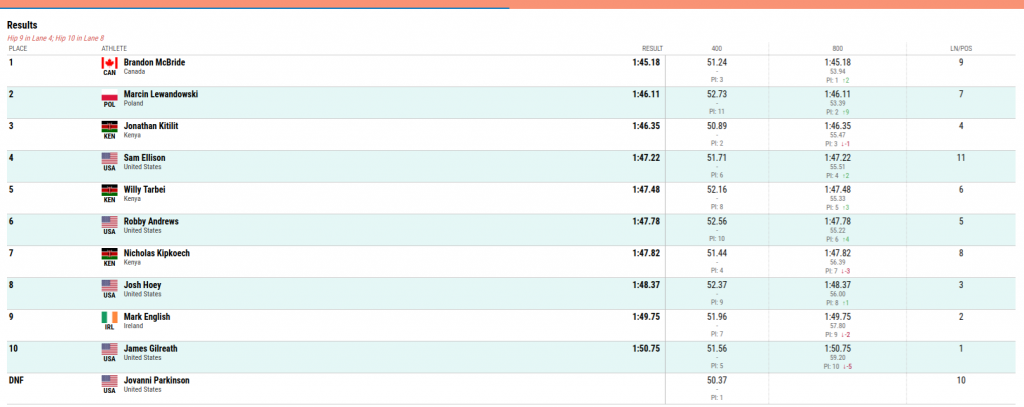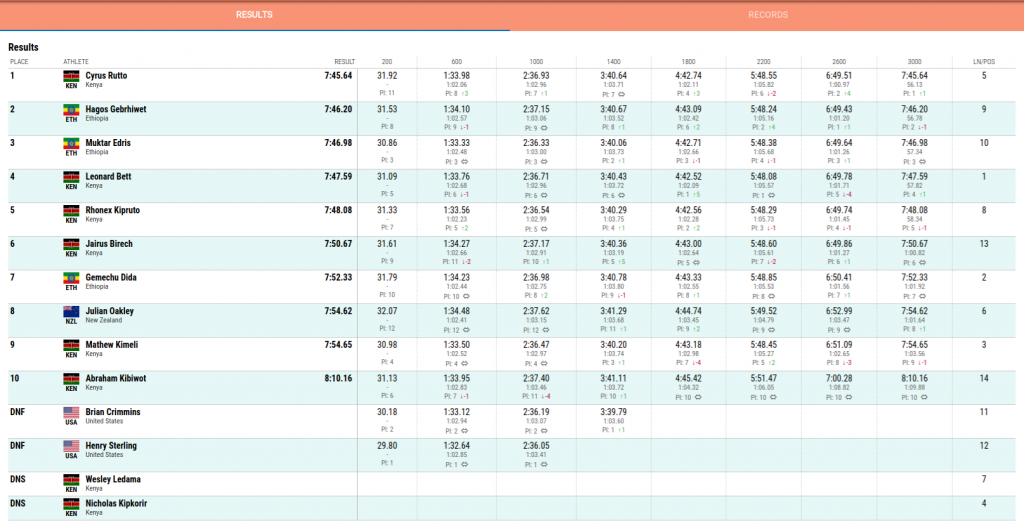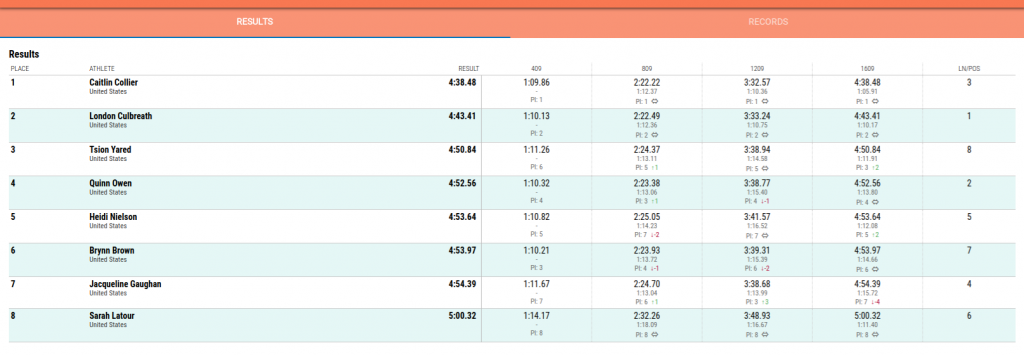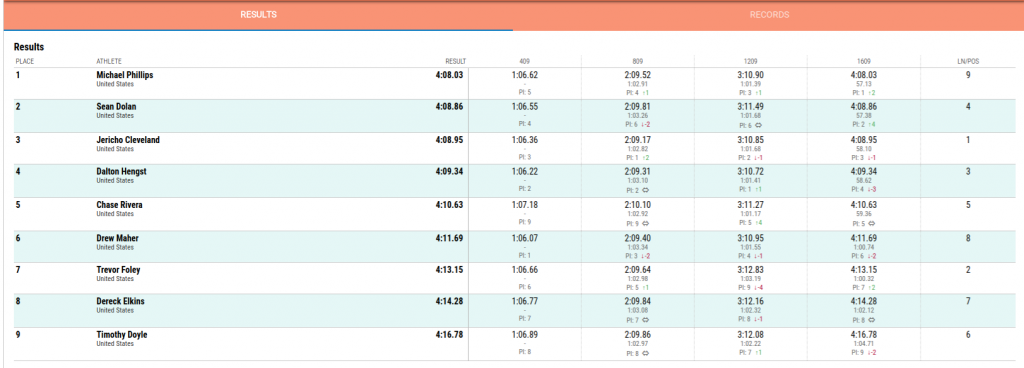Drew Hunter Earns His Biggest Win to Date, Ajee Wilson & Charlene Lipsey (4:04 1500) Impress on Day 1 at adidas Boost Boston Games
By Jonathan Gault
May 19, 2018
CAMBRIDGE, Mass. — A mist hung over MIT’s Henry Steinbrenner Stadium for most of tonight’s adidas Boost Boston Games. It made it impossible to see the Boston skyline just over the Charles River, or indeed much of anything located more than a few hard strides away from the track. What was clear, however, was the star power emanating from Drew Hunter as he won the men’s mile in 3:56.72, defeating a strong field for the biggest win of his nascent professional career. Still just 20 years old, Hunter prevailed in a race that included a two-time Olympic medalist (Nick Willis), a two-time World Championship finalist (Chris O’Hare) and a 3:32 1500 guy (Charles Simotwo).
“I came into this saying I’m gonna win,” Hunter said. “And once you have that mentality, you start to slowly believe. When you wake up every day and say I’m a winner, I’m gonna train to be a winner, I’m going to train to win this race, good things happen. You start to transform into a better runner.”
Though the result was markedly different from last year, where Hunter finished fifth in the 1500 at this meet behind both O’Hare and Simotwo, the biggest change came in Hunter’s mindset. In 2017, this is not a race that he would have gone into thinking that he could win.
“I was very timid last year, and rightfully so. I think most kids in my position would have been too. But now I’m like, I’m just as good as these guys, I earned this contract, I earned the right to be out here. Now I just treat it like I belong, and that’s been a big difference.”
Hunter was not the only star to shine in Cambridge. Though it rained intermittently, there was almost zero wind, making for decent conditions for this distance-only portion of the two-day meet. Ajee Wilson ran a US #1 1:59.27 to win the 800, her training partner Charlene Lipsey ran a US #1 4:04.98 to finish just behind Ethiopia’s Dawit Seyaum (4:04.65) in the 1500. The longer races were slower, however, as Kenyan Caroline Kipkirui claimed the women’s 5,000 in a pedestrian 15:55.24 and countryman Cyrus Rutto defeated Hagos Gebrhiwet and Muktar Edris to win a stacked men’s 3,000 in 7:45.64.
The biggest effect of the damp, cool conditions may have been to push down attendance numbers as the small bleachers on the home straight were largely empty — though that did not include the hundred or so fans on the track lining the home stretch. The weather for Sunday’s sprint portion of the meet on Boston Common should be much warmer (70s), though there is thunder in the forecast.
Race by race recap, results, interviews, and analysis below.
Men’s mile: Drew Hunter gets the biggest win of his pro career
Hunter was content to hang in the pack during the early stages of the race but because the early pace wasn’t super fast (59.92/1:59.54 for Simotwo, the first racer, at the 409 and 809 marks), most of the field was still in it with a lap to go (3:00.91). At the bell, Kenyan Brimin Kiprotich led but O’Hare passed him on the backstretch, as did Hunter, who moved into second entering the final turn. Those two separated over the final 200 and were shoulder-to-shoulder for much of the final 100, but in the end it was Hunter who held off his more experienced rival, winning in a PR of 3:56.72 after a 55.26 final lap.
Drew Hunter “can’t pull that high school card anymore”
Before the meet yesterday, I was chatting with Hunter at the press conference and we got to talking about age-group phenoms. Hunter explained that it can be difficult for athletes who run incredible times at an early age as they are expected to improve, but improvement can be difficult when one is already running times that rank among the best in the nation. I found it interesting as when Hunter turned professional, there was certainly part of me that thought the same thing about him. Remember, this is a kid that ran 3:57 in high school — among Americans, only Alan Webb has gone faster — and became the first American male distance runner to turn pro straight out of high school.
But since turning pro in 2016, Hunter’s professional career has gone about as well as was realistically possible. He made the US final and ran 3:36 last year as a 19-year-old and has been in good form in 2018. And while Hunter knows that he’s still known mostly for his high school feats, he’s looking forward, not backward. When I asked him whether this was the biggest win of his career, he responded, “Unless you count high school — but I can’t count that anymore.” Later, Hunter noted that he is running the International Mile at next week’s Pre Classic, even though he was invited to the prestigious Bowerman Mile two years ago as a high school senior.
He knows that as a high schooler chasing Webb’s record, everyone wanted to see him race the big boys. Now that he’s a pro, he’s just another 3:56 miler and 3:56 milers rarely get to run in the Bowerman Mile. In fact, there’s only one entered this year: a high schooler named Jakob Ingebrigtsen.
“I can’t pull that high school card anymore,” Hunter said.
As good as Hunter was tonight, the win doesn’t mean that he’s suddenly one of the world’s best milers. O’Hare has been banged up this year, as has Willis (who said afterward he’s only been seriously running for four weeks following a stress fracture), and Simotwo has been traveling a ton recently, running in Shanghai last week and Doha the week before that. Neither Simotwo nor Willis could break 58 seconds for their final lap — something that normally would not be a problem for them in a mile race that was 3:01 at the bell (Hunter closed in 55.26). But that’s not Hunter’s fault. He beat ’em all, fair and square.
Nick Willis busts the rust & explains who are the real victims of Kenyan doping
Willis said he’s done five workouts since returning from a stress fracture in his fibula, followed by a couple more injuries which he believes may have been side effects of coming back from that initial injury. But he’s healthy now and if he can remain that way he expects to be running in the low 3:30s for 1500 by the end of the summer. Willis’ goal tonight was to break 4:00, and though he came just short (4:00.29), he at least knows where he’s at fitness-wise.
“4:00 is sort of the baseline,” Willis said. “There’s plenty of room for improvement but plenty of room for training.”
Willis is one of the most eloquent voices in the sport, and though he’s already shared his thoughts about 2008 Olympic 1500 champion Asbel Kiprop testing positive for EPO, I was curious to know what his emotions were when he heard the news. Anger? Disappointment? Frustration?
“Nothing surprises me when I hear it,” Willis said. “I don’t get angry because I’ve already heard things many years prior to. Not necessarily specifically about him, but in general and so you know it is a good likelihood.”
Even though Willis was the man who finished second behind Kiprop at the 2008 Olympics, Willis said that even if Kiprop did take EPO (Kiprop denies it) and it cost Willis a gold medal that Willis would not be the biggest victim of Kiprop’s cheating.
“People say but you’re a victim, you might have missed out on such and such and such,” Willis said. “And I say if a Kenyan is doping, do you know who the real victim is? It’s the Kenyan who didn’t get to make the team all of those years, that never got to get out of Eldoret or Iten. They’re living in poverty. There are incredibly talented Kenyans out there, but many of them never get to realize that potential because their places on teams — which is their ticket to getting a visa to travel and race on the grand prix circuit — are stolen from them. So when locals from Kenya or whatever country are saying, oh they would never do that, they’re a hero. You’ve gotta remember, they’re robbing their fellow countrymen first and foremost.”
Women’s 800: Ajee Wilson runs US #1 1:59.27
There are very few women capable of beating Ajee Wilson in an 800, and this was a typical Ajee Wilson race as she controlled things the entire way, going 59.15-60.12 to win in 1:59.27, though she did receive a strong challenge in the home straight by former NCAA champ Natoya Goule of Jamaica, who finished .16 behind in 1:59.43. Considering Goule is coming off a 1:58.82 pb that earned her bronze at the Commonwealth Games, perhaps it’s not a surprise that she contended for the win here, but as is often the case, Wilson was simply too good.
Tonight was a good sign, but Wilson’s real test comes next week where she’ll face Caster Semenya and Francine Niyonsaba at the Pre Classic.
Ajee Wilson interview
Raevyn Rogers on graduating college, adjusting to the pro lifestyle, and moving to Philadelphia
Women’s 1500: Charlene Lipsey almost takes down Dawit Seyaum, runs big PR of 4:04.98
Lipsey was one of four women who broke away early in this race, joining Seyaum, Kenya’s Miriam Cherop, and Norway’s Karoline Grovdal. But the pace slowed slightly on the penultimate lap once the rabbit stepped off (leader Seyaum ran it in 67.81), allowing Cory McGee and South Africa’s Dominique Scott into the race as Seyaum, the 2014 world junior champ who has a 3:58 pb, hit the bell in 3:02.01.
The end of the race played out very similarly to the men’s mile. Lipsey, like Drew Hunter, moved up into second behind Seyaum on the back straight, and like Hunter, she was shoulder-to-shoulder with Seyaum for a good portion of the final 100 meters. However, the 1500 specialist Seyaum had too much for her tonight and Lipsey had to settle for second in a big PR of 4:04.98 – her second 1500 pb of the week. Lipsey’s PB coming in was 4:07.72 which she ran on Monday at Swarthmore but before that her pb was 4:10.68.
Charlene Lipsey is back — doesn’t look like a one-year wonder anymore
Lipsey was dead last in the USA Indoor 800 final back in February, and to the outside observer, it may have looked like her breakout 2017 campaign, where she went from never making a team to finishing 7th at Worlds, was a fluke. But Lipsey’s coach Derek Thompson told me he wasn’t worried about his pupil, explaining that she had gotten a late jump on training because of an Achilles injury.
Even now, Lipsey doesn’t want to talk about the injury.
“I’m a firm believer in if you race, you put yourself out there, there’s no excuses,” Lipsey said. “If you beat me, I respect that, you won. And I didn’t want to take that away from anybody.”
Thompson was proven correct today as Lipsey ran her second huge 1500 pb of the week and moved to #1 in the U.S. right now. Lipsey said she’ll continue to focus on the 800 but Thompson told me last year that he thinks the 1500 will ultimately be Lipsey’s best event.
Men’s 800: Brandon McBride cruises to victory
McBride, the 2014 NCAA champ at Mississippi State, was only 5th in Shanghai last week, but he got revenge on two of the men who beat him there, Marcin Lewandowski and Jonathan Kitilit, by winning comfortably tonight in 1:45.18, well ahead of Lewandowski in second (1:46.11). McBride explained that he felt racing in the Eastern Time Zone, where he is based, helped his body bounce back better than Lewandowski and Kitilit.
US high schooler Josh Hoey, who destroyed Robby Andrews’ US indoor HS record of 1:49.23 with a 1:47.67, ran an outdoor pb of 1:48.37 as Michael Granville‘s 1:46.57 US HS record that dates to 1996 survives yet another day.
MB: Josh Hoey HS 800 record attempt!!
Robby Andrews is shooting for some PRs this summer
Andrews ran 1:47.47 for 6th at this meet last year and won USAs three weeks later so he’ll take another 6th-place finish in 1:47.78 today (though he tried to fool me into thinking he set the world record!). Andrews said that workouts have been going well and that he’s hoping to lower his PRs in the 800 (1:44.71 from 2011) and 1500 (3:34.78 from 2012), both of which are pretty old at this point.
Andrews also said he’s having a blast helping out his coach Jason Vigilante with the Princeton team and that he’d one day like to become a high school coach.
Brandon McBride interview
Men’s 3000: Kenya’s Cyrus Rutto takes down some Ethiopian studs
After hitting 1600 in 4:10, any chance of a truly fast time was gone, and the pace slowed even further as leader Leonard Bett ran the third-to-last lap in 65.57. The pace picked up over the next lap as the leaders positioned themselves for the kick, but at the bell it was still anyone’s race, with six men clustered within half a second of each other, including Rutto, Hagos Gebrhiwet and 5,000 world champ Muktar Edris.
It was Gebrhiwet who seized the lead at the bell, and he looked as if he would hold it but Kenya’s Cyrus Rutto, sporting a black skullcap on a cool night, had one more gear and pulled ahead of Gebrhiwet in the home stretch to claim the win in 7:45.64. His 56.13 final 400 was not incredibly fast for a race of this caliber, but it’s more impressive when you consider he ran the lap before in 60.97 for a final 800 of 1:57.10.
Despite their dominance of global distance running, Kenya’s results in the men’s 5,000 have been poor in recent years; at the 2016 Olympics they did not put a single man in the final. The 26-year-old Rutto could be the man to lead the resurgence. He beat two of Ethiopia’s best tonight in Gebrhiwet and Edris, and he was the sole Kenyan to make last year’s World Championship final (though he only finished 13th). Rutto, who trains under Patrick Sang in Kaptagat (and works out with Geoffrey Kamworor when the latter is training for the track), said that he wants to reestablish Kenya as a power in the men’s 5,000.
“Yes that is the main aim, to bring the Kenyan name back in the 5,000,” Rutto said.
Women’s 5,000: Caroline Kipkirui wins again
The early stages of this race were slow as the five racers were on 15:27 pace through 2200 meters and they would only slow from there until the kicking began in earnest over the final two laps. Just as in Doha two weeks ago, it was master of all surfaces and distances Caroline Kipkirui who earned the win, though her time of 15:55.24 won’t turn any heads. Good thing she has an 8:29 3k and 65:07 half marathon on her resume this year.
adidas Girls’ Dream Mile: Stanford commit Caitlin Collier crushes everyone in 4:38.48 (65.91 final lap)
adidas Boys’ Dream Mile: Michael Phillips wins
Phillips, a Florida native, will be heading north next year for school as he’s going to Syracuse.
Re-live day 1 and look ahead to day 2 of the adidas Boost Boston Games on Sunday on the LetsRun.com messageboard:
MB: Official adidas Boost Discussion Thread
MB: Drew Hunter does it! Takes down O’Hare + Willis + a 3:33 guy to get biggest win of career at adidas Boost
MB: HS Josh Hoey Runs 1:48 in his record attempt Michael Granville‘s 1:46.45 seems safe.

